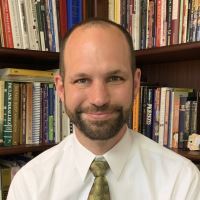Commentary on Isaiah 62:1-5
The opening verses of Isaiah 62 contain a hope of a land fully embraced and loved by both humans and God. But they also call for caution as the conditions that will lead to the universal love and acclaim of the land are not yet met. Good news is coming, but it is not here yet.
The chapter begins with an unnamed speaker asserting that there is work that must be done. Commenters differ on whether the voice is God, a/the messiah or the prophet. In any case, the speaker insists that to cease speaking would be to harm Zion and Jerusalem. Instead, the speaker will keep proclaiming the message until righteousness and salvation shine forth from the land. The implication is, of course, that righteousness and salvation do not yet shine forth from the land, or that they are presently too dim to be noticed. Once the surrounding lands are bathed in the light of righteousness and salvation that shine forth from Zion, the Holy Land will enjoy love and attention from three different sources.
The first group to respond to Zion’s coruscating righteousness will be other nations and their rulers. As in the pericopes from Isaiah in the last few weeks, Isaiah 62 foresees a time when the light of righteous will be so profoundly attractive that other peoples will chose to make pilgrimage to investigate the practices of a righteous people, dwelling in a Holy Land with their intimate and immanent God.
Next, God responds to Zion, whose righteousness and salvation beam forth into the rest of the earth. We must notice here, that unlike the preceding lectionary readings, the land, rather than the people, is the recipient of God’s affection in this passage. God will give the land a new name to signify and concretize their new relationship. No longer will the land be forsaken/Azubah or desolate/Shmamah. Instead, God proclaims “My delight is in her”/Hephzibah and that the land is married/Beulah.
God has had a complicated relationship with the Holy Land to this point. When looking to understand the experiences of exile, the Children of Israel turned, among other places, to Deuteronomy. The main consequence for systemic and personal sins (see a short, but illustrative list in Deuteronomy 27:15-26) was that the people would be exiled (Deuteronomy 28:36-37, 64-68).
But before the exile, God would forsake the land (Deuteronomy 28:23-24, 38-42). The sky would become as solid as bronze and the land would be as unyielding iron. Rain would come only as dust and powder. The locust, worm and cricket would consume the harvest. As a consequence of disobedience, God would cause desolation on the land that God was once worried might be dangerously over-productive and too fertile (Deuteronomy 8:7-19). Isaiah 62 foretells a return to type for the Holy Land. Where once God caused it to be forsaken and desolate, it will return to glorious productivity and fecundity. God will rejoice over the land as a groom rejoices over a bride (Isaiah 62:5).
This return of the Holy Land to its graced and favored fruitfulness does not go unnoticed by the Children of Israel. While God is rejoicing over the land as if they were newlyweds, the sons of Israel also marry the land (verse 5). This is no simple return to farming land that has laid fallow for a period. Instead, humans will love and care for the land, seeing their performance of righteousness with and in the land as intimately connected to the blessedness of their harvests, God’s rejoicing and their own happiness.
It is not difficult to see parallels with our own times. Systemic sins and individual greed have led to desolation of land. Failure to love our siblings and our progeny has led to neglect of the environment, and this brought about global climate change. How can this blight on the land be reversed? Simply not shutting up about the problem seems to be the first step, according to Isaiah 62:1. For Cairo’s sake I will not be quiet, for Egypt’s sake I will not stop speaking.
Today, the environment has been so degraded by damming upriver that the Nile is insufficient to water crops in the Delta, and so farmers are forced to use sewage water to irrigate, making themselves and their customers sick. We cannot stop calling for righteousness until just solutions are found that provide water for Sudan and Egypt, as well as electricity for Ethiopia. When righteous and just solutions come, the land and people will no longer be poisoned. Instead, we will—and more importantly, God will—delight in the goodness of creation. The light that shines forth from Zion will testify that the land is being used for and with righteousness.


January 16, 2022